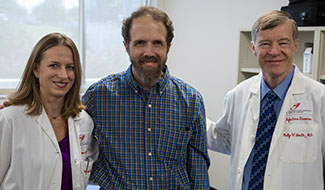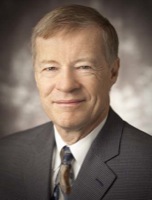 |
| Dr. Angela Hewitt, Dr. Rick Sacra, and Dr. Phil Smith at the UNMC Biocontainment Unit |
| Dr. Rick Sacra out of trouble and ready to go home after contracting the deadly Ebola Virus in West Africa |
“It was very gratifying for the entire team that treated Dr. Sacra to see him walk out the doors healthy again,” said Dr. Phil W. Smith, medical director of the Biocontainment Unit and professor of infectious disease and epidemiology at UNMC. “When he arrived three weeks ago, he was extremely ill with a virus the world doesn’t have a lot of experience treating. To know that we were able to play a role in helping his body fight off the virus so he could be reunited with his family and continue doing the work he’s so passionate about makes the years we’ve spent training and preparing for something like this more than worth it.”
"I am so grateful,” said Dr. Sacra. “Just so incredibly grateful to have gotten through this illness! Many were praying for me, even people I did not know personally. During the time I was here, there was a growing confidence that God was answering those prayers, and that I was steadily improving. Thanks to God and to the team here at The Nebraska Medical Center!"
“It was very gratifying for the entire team that treated Dr. Sacra to see him walk out the doors healthy again,” said Phil Smith, M.D., medical director of the Biocontainment Unit at The Nebraska Medical Center.
"My care team was excellent," Dr. Sacra said. "They were compassionate, patient and provided an incredibly high level of care." He said as he began to feel better and was feeing like leave the unit, those caring for him at UNMC did everything they could to keep him entertained. "They brought me books to read, played chess with me and we had conversations about dozens of different topics," Dr. Sacra said. "My only worry is that I may not recognize them when I am out of the unit, since I only know them by their eyes and their voices!"
 |
| Dr. Phil W. Smith, medical director of the Biocontainment Unit at UNMC Omaha |
Dr. Sacra contracted the Ebola virus while treating patients in West Africa. He was working for SIM, an international missionary group that responds to areas of need worldwide. "I would like to offer a heartfelt 'thank you' to the exceptional doctors, nurses and staff at The Nebraska Medical Center for your caring hearts, keen minds and gifted abilities with Rick and Debbie,” said Bruce Johnson, president, SIM USA. “May God multiply your work, that it will result in the survival of thousands in West Africa who may become infected with Ebola."
Dr. Sacra was the first patient in The Nebraska Medical Center’s Biocontainment Unit when he was admitted on Sept. 5, 2014. While being treated at UNMC, Dr. Sacra received a research drug called TKM-Ebola, which inhibits the virus’s ability to replicate in vivo. He was also treated by a plasma infusion from Ebola survivor Dr. Kent Brantly, along with other supportive care. So far, there still is no known cure for the Ebola virus.
References:
- Medicine of Omaha—5 U.S. aid workers monitored and quarantined for Ebola in Omaha released (3/31/15)
- Medicine of Omaha—Patient exposed to the Ebola virus hospitalized in Omaha (1/5/15)
- Medicine of Omaha—UNMC's third Ebola patient, Dr. Martin Salia, dies in Omaha (11/18/14)
- Medicine of Omaha—The second patient treated for Ebola at the UNMC in Omaha has been released after testing negative for the virus (10/23/14)
- WOWT—Dr. Sacra Returns Home Free From Ebola Virus (9/26/14) with video
- Omaha World-Herald—'Nebraska, 1. Ebola, 0.' Dr. Rick Sacra back home after leaving Nebraska Medical Center (9/25/14)
- Chicago Tribune—U.S. missionary with Ebola en route to Nebraska for treatment (9/4/14)

No comments:
Post a Comment